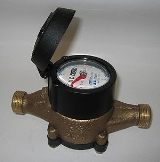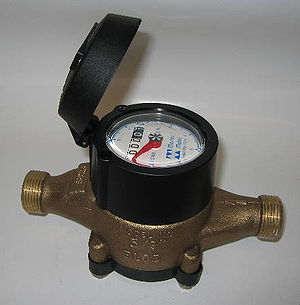
Water metering
Encyclopedia
Water metering is the process of measuring water use through water meter
s.

in many countries, as well as for industrial self-supply with water. However, it is less common in irrigated agriculture, which is the major water user worldwide. Water metering is also uncommon for piped drinking water supply in rural areas and small towns, although there are examples of successful metering in rural areas in developing countries, such as in El Salvador.
Metering of water supplied by utilities to residential, commercial and industrial users is common in most developed countries, except for the United Kingdom
where only about 30% of users are metered. In some developing countries metering is very high, such as in Chile
where it stands at 96%, while in others it still remains low, such as in Argentina
.
The share of residential water metering in selected cities in developing countries is as follows:
Nearly two-thirds of OECD countries meter more than 90% of single-family houses. A few are also expanding their metering of apartments (e.g. France and Germany).
While the cost of purchasing residential meters is low (in the range of US$20 per meter), the total life cycle costs of metering are higher. For example, retrofitting apartments in large buildings with meters for every apartment can involve major plumbing work and can be very costly.
Water meter
A water meter is a device used to measure the volume of water usage. This article provides an overview of technical aspects of water meters. The worldwide prevalence of metering as well as its economic benefits and costs are covered in the separate article on water metering.In many developed...
s.

Prevalence
Water metering is common for residential and commercial drinking water supplyWater supply
Water supply is the provision of water by public utilities, commercial organisations, community endeavours or by individuals, usually via a system of pumps and pipes...
in many countries, as well as for industrial self-supply with water. However, it is less common in irrigated agriculture, which is the major water user worldwide. Water metering is also uncommon for piped drinking water supply in rural areas and small towns, although there are examples of successful metering in rural areas in developing countries, such as in El Salvador.
Metering of water supplied by utilities to residential, commercial and industrial users is common in most developed countries, except for the United Kingdom
Water supply and sanitation in the United Kingdom
Public water supply and sanitation in the United Kingdom is characterized by universal access and generally good service quality. A salient feature of the sector in the United Kingdom compared to other developed countries is the diversity of institutional arrangements between the constituting parts...
where only about 30% of users are metered. In some developing countries metering is very high, such as in Chile
Water supply and sanitation in Chile
Water supply and sanitation in Chile is characterized by high levels of access and good service quality. Compared to most other countries, Chile's water and sanitation sector distinguishes itself by the fact that all urban water companies are privately owned or operated...
where it stands at 96%, while in others it still remains low, such as in Argentina
Water supply and sanitation in Argentina
Water supply and sanitation in Argentina is characterized by relatively low tariffs, mostly reasonable service quality, low levels of metering and high levels of consumption for those with access to services. At the same time, according to the WHO, 21% of the total population remains without access...
.
The share of residential water metering in selected cities in developing countries is as follows:
- 99% in Santiago de Chile (1998)
- 96% in AbidjanAbidjanAbidjan is the economic and former official capital of Côte d'Ivoire, while the current capital is Yamoussoukro. it was the largest city in the nation and the third-largest French-speaking city in the world, after Paris, and Kinshasa but before Montreal...
, Côte d'Ivoire (1987) - 62% in cities in Guatemala (2000)
- 30% in LimaLimaLima is the capital and the largest city of Peru. It is located in the valleys of the Chillón, Rímac and Lurín rivers, in the central part of the country, on a desert coast overlooking the Pacific Ocean. Together with the seaport of Callao, it forms a contiguous urban area known as the Lima...
, Peru (1991) - 28% in Kathmandu, Nepal (2001)
- 2% in Buenos AiresBuenos AiresBuenos Aires is the capital and largest city of Argentina, and the second-largest metropolitan area in South America, after São Paulo. It is located on the western shore of the estuary of the Río de la Plata, on the southeastern coast of the South American continent...
, Argentina (1992)
Nearly two-thirds of OECD countries meter more than 90% of single-family houses. A few are also expanding their metering of apartments (e.g. France and Germany).
Benefits
The benefits of metering are that:- in conjunction with volumetric pricing it provides an incentive for water conservation,
- it helps to detect water leaks in the distribution network, thus providing a basis for the reduction of Non-revenue waterNon-revenue waterNon revenue water is water that has been produced and is “lost” before it reaches the customer. Losses can be real losses or apparent losses . High levels of NRW are detrimental to the financial viability of water utilities, as well to the quality of water itself...
; - it is a precondition for quantity-targeting of water subsidies to the poor.
Costs
The costs of metering include:- the investment costs to purchase and to install meters, as well as
- the recurrent costs to read meters and to issue bills based on consumption instead of bills based on monthly flat fees.
While the cost of purchasing residential meters is low (in the range of US$20 per meter), the total life cycle costs of metering are higher. For example, retrofitting apartments in large buildings with meters for every apartment can involve major plumbing work and can be very costly.
Problems
Problems associated with metering arise particularly in the case of intermittent supply, which is common in many developing countries. Sudden changes in pressure can damage meters, so that many meters in cities in developing countries are not functional. Also, some types of meters become less accurate as they age and underregister consumption thus leading to lower revenues, unless they are being replaced regularly. Many types of meters also register air flows, which can lead to overregistration of consumption, especially in systems with intermittent supply, when water supply is re-established and the incoming water pushes air through the meters.Effect on consumption
There is disagreement as to the effect of metering and water pricing on water consumption. The price elasticity of metered water demand varies greatly depending on local conditions. The effect of volumetric water pricing on consumption tends to be higher if the water bill represents a significant share in household expenditures. There is evidence from the UK that there is an instant drop in consumption of some 10% when meters are being installed. In Hamburg, Germany, domestic water consumption for metered apartments (112 liter/capita/day) was 18% lower than for unmetered apartments (137 liter/capita/day) in 1992. The municipal utility Hamburger Wasserwerke GmbH had installed more than 40,000 water meters in individual apartments of older houses since 1985. All new apartments had to be metered by law. Previously there had been only a single meter for the entire house in multi-apartment houses.See also
- Automated meter reading
- Utility submeterUtility submeterUtility Submetering is the implementation of a system that allows a landlord, property management firm, condominium association, homeowners association, or other multi-tenant property to bill tenants for individual measured utility usage...
- Water conservationWater conservationWater conservation refers to reducing the usage of water and recycling of waste water for different purposes such as cleaning, manufacturing, and agricultural irrigation.- Water conservation :Water conservation can be defined as:...
- Water meterWater meterA water meter is a device used to measure the volume of water usage. This article provides an overview of technical aspects of water meters. The worldwide prevalence of metering as well as its economic benefits and costs are covered in the separate article on water metering.In many developed...

